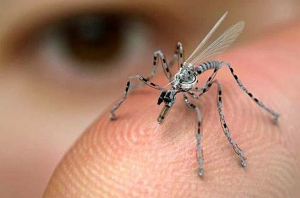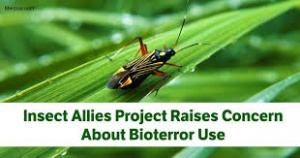Difference between revisions of "Insect Allies Project"
| Line 20: | Line 20: | ||
<ref> Insect Allies, Dr. Blake Bextine, 2018. https://www.darpa.mil/program/insect-allies</ref> | <ref> Insect Allies, Dr. Blake Bextine, 2018. https://www.darpa.mil/program/insect-allies</ref> | ||
<ref> Scientists Fear DARPA , Haskins, Carolina, 2018. https://www.vice.com/en_us/article/598kq5/scientists-fear-darpas-insects-allies-will-attack-global-food-supply-with-viruses</ref> | <ref> Scientists Fear DARPA , Haskins, Carolina, 2018. https://www.vice.com/en_us/article/598kq5/scientists-fear-darpas-insects-allies-will-attack-global-food-supply-with-viruses</ref> | ||
| + | |||
| + | [[Category:2020New]] | ||
| + | [[Category:2020Concept]] | ||
Revision as of 12:08, 17 March 2020
The Insect Allies Project is DARPA (Defense Advanced Research Projects Agency) program seeking countermeasures against threats to the U.S. crop system and food supply. This program was launched by the Department of Defense in 2016. The main goal of this project is to mitigate the threat of flooding, drought, and pathogens to U.S. crops. To accomplish this goal, DARPA is using an insect delivery system to modify the genes of plants. DARPA is using a tripartite approach consisting of viral manipulation, selective gene therapy, and insect vector optimization. DARPA's hope is that this will allow a positive alternative to negative crop control, such as pesticides and slash-and-burn techniques. The overall hope of the program is to crush future threats to U.S. national security that arise when the crop structure is damaged. The basic backbone of this project is the very cycle between insects and plants. Through the natural cycle, insects eat plants and transmit viruses to them. DARPA is hoping to make these viruses positive and beneficial in the future. Researchers from several U.S. institutions, including Penn State University, Ohio State University, The University of Texas, The Boyce Thompson Institute, The University of Minnesota, Iowa State University, and the University of California, are members of the project.
Contents
Tripartire System
In order for this idea to be successful, all three parts of the project must be successfully addressed. This is tricky, as each part is heavily reliant on each other, and each part has several wildcards.
Viral Manipulation
The first part of the project involves genetically engineering viruses to improve crop growth. This involves an immense amount of testing and scientific effort. Even if an appropriate virus is successfully engineered, there is no guarantee the other two parts of the three-part system will also work. Researchers from several universities are working hard on this part, as any, even small, mistake could greatly damage crops.
Insect Vector Optimization
The delivery system of these new engineered viruses is solely dependent on insects. Scientists control the viruses they are engineering, but they do not control the courier insects. There is a high risk that the insect delivery system will not work as intended. That is, the insects could not spread out the viruses as intended or not spread the virus at all. This is arguably the biggest wildcard of the project, as there is little that scientists can do to perfect the courier system.
Selective Gene Therapy
Another wild card in this project is the adaptation of the infected plants. There is no way to be certain the infected plants will act as they are supposed. Some immune systems of plants will fight off the virus intended to help them, counteracting the effects of the program.
Ethical Issues
The Positives
A number of ethical issues arise from the Insect Allies Project. There are multiple positive benefits, as well. If done right, this program will effectively mitigate the threats to our national crop system, the backbone of our food and agriculture. Both natural and engineered threats by state and non-state actors will be expunged, such as global warming, pesticides, and quarantine. If successful, America will avoid national security threats due to a lack of crops and will secure a major victory. Despite all of these benefits, there are still major risks involved as ethical issues arise.
The Negatives
Some scientists fear that DARPA is manufacturing the next biological weapon. If Insect Allies can be used to help crops, then it can also be used to hurt crops, experts fear. That is, this program can be used to weaken and destroy an enemy's crop and agricultural system in times of war and conflict. Spokespeople from DARPA and Insect Allies have acknowledged this fear and emphasized that this project was only added and will only be used for positive benefits to crops. The project is currently only in the hands of DARPA, the Department of Defense, the Environmental Protection Agency, and the U.S. Army. It is safe to say no foreign, non-state actors could get their hands on this technology as it solely belongs to the United States. However, there is still public panic, who fear this program can be used for the worst. In spite of this panic, the program has too many benefits to not be welcomed by the public. As of now, the talk of Insect Allies as the next stage of biological weapons is just speculation as fear raises among the paranoid sect of scientists. Insect Allies comes with major benefits that cannot be ignored, even as serious ethical issues arise.
References
[2]- ↑ Insect Allies, Dr. Blake Bextine, 2018. https://www.darpa.mil/program/insect-allies
- ↑ Scientists Fear DARPA , Haskins, Carolina, 2018. https://www.vice.com/en_us/article/598kq5/scientists-fear-darpas-insects-allies-will-attack-global-food-supply-with-viruses

